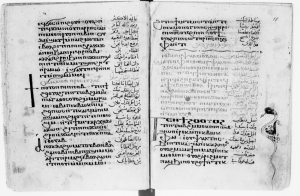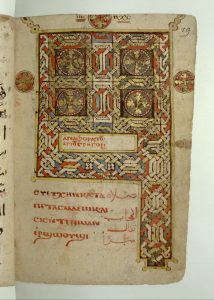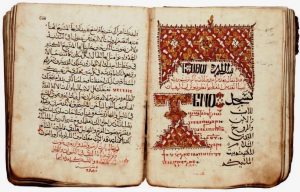Since the creation of man, sin caused the Lord to curse the earth. When Adam sinned and disobeyed God, the Lord condemned him saying:
“Cursed is the ground because of you; through painful toil you will eat food from it all the days of your life. It will produce thorns and thistles for you, and you will eat the plants of the field. By the sweat of your brow you will eat your food until you return to the ground, since from it you were taken; for dust you are and to dust you will return.” – Genesis 3:17-19
In the next chapter of Genesis, the Lord again curses the ground because of murder. Cain killed his brother Abel because while they both gave from what they had, God rejected his offering and accepted Abel’s. Thus, what we give to the Lord must be worthy of Him in order to be accepted.
After Cain killed his brother, the Lord confronted him:
The Lord said, “What have you done? Listen! Your brother’s blood cries out to me from the ground. Now you are under a curse and driven from the ground, which opened its mouth to receive your brother’s blood from your hand. When you work the ground, it will no longer yield its crops for you. You will be a restless wanderer on the earth.” – Genesis 4:10-12
In the story of Noah we see yet again that the sins of man corrupt the earth, deeply paining the Lord:
“Now the earth was corrupt in God’s sight and was full of violence. God saw how corrupt the earth had become, for all the people on earth had corrupted their ways.” – Genesis 6:11-12
“The Lord saw how great the wickedness of the human race had become on the earth, and that every inclination of the thoughts of the human heart was only evil all the time. The Lord regretted that he had made human beings on the earth, and his heart was deeply troubled.” – Genesis 6:5-6
However, Noah found favor in the sight of the Lord, and God directed him to safety. It is then that we see the first covenant created between God and man:
“Then Noah built an altar to the Lord and, taking some of all the clean animals and clean birds, he sacrificed burnt offerings on it. The Lord smelled the pleasing aroma and said in his heart: ‘Never again will I curse the ground because of humans, even though every inclination of the human heart is evil from childhood. And never again will I destroy all living creatures, as I have done. As long as the earth endures, seedtime and harvest, cold and heat, summer and winter, day and night will never cease’.” – Genesis 8:20-22
Vai etafenf
“This is he who offered himself [up high] as an acceptable sacrifice upon the cross for the salvation of our race. His Good Father smelled him at the time of evening on Golgotha.”
Vai etafenf epswi@ `nou;ucia ecsyp@ hijen pictauroc@ qa `poujai `mpengenoc. Afswlem erof@ `nje Pefiwt `naga;oc@ `mvnau `nte hanarouhi@ hijen ]Golgo;a.
Meaning
In order to perceive the full meaning of the hymn we need to understand where it comes from. These two verses above are taken from the last portion of the Sunday Theotokia, from the hymn Auen Piar,yereuc.
“They likened the archpriest, to our Savior, the true Sacrifice, for the forgiveness of sins. He who offered Himself, as an acceptable sacrifice, upon the Cross, for the salvation of our race. His good Father, smelled Him, in evening, on Golgotha. He opened the gate, of Paradise, and restored Adam again, to his authority. Through Mary, the daughter of Joachim, we learned of the true Sacrifice, for the forgiveness of sins. And we also pray, that we may win mercy, through your intercessions, with the Lover of Mankind.” – Text from Coptic Reader
Every single word in this hymn is specific and significant, so let’s take it in small sections.
1. This is he who offered himself [up high]
A. In the Old Testament, priests were the only persons allowed to offer sacrifices on account of peoples’ sins. Christ offering himself declares and affirms his High Priesthood as is mentioned by the first verse of Auen .
B. Christ’s sacrifice was of His own will. He freely emptied himself to fill us. He was not forced, or in need, but was pleased, even overjoyed to die for us.
2. An acceptable sacrifice
A. Christ’s sacrifice was the only true and acceptable sacrifice capable enough to wipe out human sin. The old sacrifices of atonement were not complete or everlasting, whereas our Lord’s death for us is a fountain ever-flowing with forgiveness.
3. Upon the Cross
A. Jesus Christ’s death on the cross was a fulfillment of the prophecies. The Son of Man was to be lifted up. Our Lord himself stressed that point several times. Please see the gospel of St. John, chapter 3:14, 8:28, 12:32-34. You’ll notice that although the translation omits it, the word epswi means high or in this case up high.
B. There is a similarity in the prophecies of the eleventh hour of Tuesday of Holy Week, when Christ announced his crucifixion, from the book of Isaiah:
“On every high mountain and on every high hill there will be streams in that day, when many perish and the towers fall. In that day the light of the moon will be as the light of the sun, and the light of the sun will be seven fold, when the Lord heals the wounds of his people and the pain of your plague.” – Isaiah 30:25-26 Coptic Reader Text
C. The cross was the altar made of wood that our Lord offered himself on.
4. For the salvation of our race
A. The sacrifices of old were merely for the forgiveness of sins as is also indicated by the first verse in the hymn Auen. However, Christ’s offering gave not only forgiveness but salvation.
B. The sacrifice was not only for the Jews who went to their high priest but for the entire human race.
5. His Good Father smelled Him
A. As mentioned before, it is the pleasing aroma of incense that caused God to establish a covenant with mankind to never destroy them again. We spoke previously about the incense being offered in the censer being a living symbol of Christ Himself. How beautiful then is it that we see God the Father establishing a new covenant with mankind, through His only Son?
6. In the evening
A. Exodus 30:8 – “And when Aaron lights the lamps at twilight [defined as the soft glowing light from the sky when the sun is below the horizon], he shall burn incense on it, a perpetual incense before the Lord throughout your generations.”
B. Numbers 28:8 – “The other lamb you shall offer in the evening; … you shall offer it as an offering made by fire, a sweet aroma to the Lord.”
C. Psalm 141:2 – “Let my prayer be set before You as incense, The lifting up of my hands as the evening sacrifice.”
7. On Golgotha
A. It has been said that Golgotha is known as the place of the skull because it is where Adam is buried. Whether this is fact or legend I personally do not know, although many of our icons and pictures do include a skull under the cross of our Lord. The point still stands however that Jesus Christ’s sacrifice restored our father Adam and saved him and his entire race. Although not commonly chanted with the hymn on Good Friday, the next verse of Auen clarifies the point that Christ opened paradise and gave Adam his glory once again.
History
It is difficult to identify when exactly these two verses were specifically chosen and made into another hymn. I am currently working on getting photos of a manuscript said to be from the 14th century with the earliest mentioning of the hymn during Holy Week. Both Ibn Kabar and Pope Gabriel do not mention it in their works. It is mentioned, however, in both the sixth and ninth hour prayers from this manuscript in 1896.
Sixth Hour – note that the second verse is written as afsanswlem (and that e;be ]anactacic is mentioned; not ]epictoly)

Youssef Habashy’s Holy Week Book – here the second verse is also written as afsanswlem
Current Use
Today we chant Vai etafenf on Holy Thursday during matins offering of incense, on Good Friday in the sixth and ninth hour, and on the feasts of the cross also during the offering of incense of the Liturgy of the Word. It is also chanted during the funerals of clergy members.
Musical Tradition
This hymn shares many similar pieces with the other hymns said at times of raising incense, including `N;o pe ]soury @ Sare Vnou] @ Hiten niprecbia. Because this hymn shares these melodies and is said in these different seasons it is not appropriate, in my opinion, to term it as a sad or “hazainy” hymn. As a matter of fact, the hymn should reflect the joy and comfort of salvation that we attained through the sacrifice of our Lord on the cross.
Most of the differences in the renditions of the hymn come in the second verse and are affected by geographic location, however there are slight variations of certain parts in the first verse, most probably due to the speed it was chanted at, or the specific cantors memory.
CAIRO
Deacon Ibrahim Ayad
Holy Week Album
Old Holy Week Album
Good Friday Live 1984
Cantor Fahim Girgis
Occasion Tapes
Miscellaneous Tape
Live 1983
Live 1989
Cantor Farag Abdelmessih
Holy Week
Feast of the Cross
Higher Institute of Coptic Studies
Cantor Gad Lewis
Cantor Amir Saleh
There is also another recording that I am currently working on digitizing and uploading as well from Cantor Ayoub from St. Anthony’s Church in Shobra.
ALEXANDRIA
Cantor Habib Hanna
Cantor Lotfy Boutros
Cantor Naeem Hanna Boulis
Mr. Sobhy Kolta
Mr. Moawad Dawoud Abdelnoor
Cantor Wahba Eryan
Cantor Nagy Mousa
UPPER EGYPT
Cantor Tawfik Youssef – chanted both verses in the long tune
Cantor Wadea el kommos Matta – chanted both verses in the long tune. Important to note that in the live recording he said the first verse during the sixth hour and the second verse during the ninth hour.
Complete
Live sixth hour 1993
Live ninth hour 1993
Cantor Wissa Attia – chanted the first verse long and the second verse in the tune from Midnight Praises. He also chanted the third verse in a live recording on Good Friday.
Holy Week Tape – the recording itself is choppy
Live sixth hour
Live ninth hour
Mr. Fahim Ayoub – recorded for Cantor Wissa in his tapes
Corrections
I would like to point out a few mistakes that are commonly made in this hymn.
The first is that some cantors and deacons add an `i before the word epswi. This is incorrect because it is not part of the text, but rather a mispronunciation of the first letter of epswi. Also the addition of `i adds the word “come” which is grammatically incorrect and doesn’t fit the context.
The second is the word ecsyp which means acceptable. You will notice that the Alexandrian cantors pronounced it as “esecheeb” which is just a faulty pronunciation due the change from original bohairic coptic.
Personal Contemplation
I thank You Lord that You were not only willing, but pleased, to be lifted up onto the cross to save me. You endured torture and humiliation in order to restore my life. You turned my shame into glory by Your sacrifice. Help me Lord to remember how much You gave up for me. Guide me Lord to look to Your cross and be healed. Enlighten my life with the grace You granted me through Your sacrifice.
It is amazing to see how meticulous You are Lord. Man’s salvation was part of Your plan and You showed it to him through the prophets several times, until You humbly came to declare him free. In the perfect time You completed all the prophecies. You established a covenant with Your people in which you did not only forgive them, but made them partakers in Your body. Accept my prayers O Father, as a sweet aroma of incense, as You accepted the offering of Your Son on my behalf.



